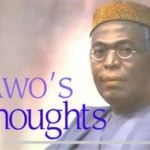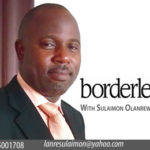
That verdict, to government officials is some good news and evidence of hard work. To critics, there was nothing to cheer especially as the fringe growth has not impacted on the teeming populace. The ruling All Progressives Congress (APC) praised the government to high heavens for exiting recession after five consecutive quarters of negative growth. It also claimed that the marginal GDP rise was a clear sign of its determination to better the lots of Nigerians. But the main opposition party, Peoples Democratic Party (PDP), insisted there was nothing to celebrate especially as the NBS report still contained evidence of negative growth in key sectors of the economy added to skyrocketing food prices.
Despite the back and forth analysis from economic experts and commentators across the length of the population, I have remained largely unimpressed at the widespread claim of recession in the economy since 2016. Yes, the economy had recorded negative incidents since late 2015 when the acclaimed “body language of the new Sheriff in town” suddenly went blur. Banks have been forced to retrench. The US Dollar skyrocketed from about N180 to one dollar to over N500 at an instance. Prices went above the roof and the cost of living became unbearable for many.
In sticking to my skepticism about the claim of recession, I had opposed the Federal Government’s plan to approve bail-outs for states, which cropped several months’ arrears of salaries, pensions and gratuities. My take was that the governors should rather be called to account for the states’ resources since there was no evidence the Federal Government owed them any of the ballooning largesse of the oil boom era. I am still convinced many of the governors diverted the money to fund the 2015 election, in their belief that the bullish oil price would sustain. Between 2015 and now, Federal Government has cumulatively given out what could pass for bail outs on four occasions (Paris club refund and direct bailouts) while the situation has not really changed.
It thus looks like my position that there was no justification for issuing out the bail-outs in the first instance has been vindicated. Outside the economic hardships being experienced by all, the fact that the three tiers of government had shared a whooping N3.010 trillion in first half of 2017 is evidence that the recession is not a creation of the gods.
Do we have anything really to show for all these figures, which is outside the IGR of the 36 states and the FCT and when you add the expenses of the revenue generating agencies which are not part of the Federation Account, you get the impression we are running a ‘basket is never full of water’ economy.
I was pleasantly surprised to see an ally in that thinking in the former governor of Ogun State, Chief Gbenga Daniel. Daniel told me pointedly in Abuja there was no recession. I put that claim to a few finance enthusiasts and there was no clear fact to burst the claim.
Yes, on paper, the country was bleeding, but the facts responsible were not only man-made, they were well-created after the 2015 elections. Hear the former Governor: “It is my considered view that Nigeria has never been in a recession. Quite on the contrary, we have been prodigal. We have become used to managing wealth. We don’t know how to manage poverty.”
He insisted that rather than spending to oil the productive sectors of the economy, which would have immediate impact on the people, we have been largely engaged in capital flight.
According to the former governor, the traditional economists’ proposal that you spend your way out of recession is right but you must be vigilant to know what you are spending on. When you borrow money from China, award the contract to Chinese companies and more than half of the workforce come from China, you have surely repatriated a huge chunk of the borrowed fund back to the creditor country, while you remained saddled with the burden of paying back the loan in years to come. When President Donald Trump shouted America First! America First!! He knew what he was saying. The story is that America’s money must largely stay in America. When after sharing the ‘loot’ in Abuja, two-thirds of the money is deployed to service health and educational tourism in Ghana, South Africa, Egypt and the Western countries. A huge chunk is further deployed to import trivial items like toothpicks special sharp sand and banana!
Every economy that is thriving today had taken time to strictly constrain itself in the form of ‘buy America’ or ‘buy China’ policy. Without that the economy will keep groping in the dark. I once read the story of how Honda cars entered American market. The Japanese company at inception was frustrated at the lack of patronage of its products by Americans. A concerned management contracted top American automobile professors who produced a blueprint. The implementation of the expert advice coincided with big boom in sales of Honda in America. Worried by the huge sales of Honda, the then American government promptly banned the sale of Honda in America despite existing trade agreement. The condition is for Honda to locate its factory in America if it must sell the products. It worked in a win-win situation and today you have American versions of Honda and Toyota.
If Peugeot and Innoson motors are what Nigeria can boast of, why should government agencies patronise any other? If our electric metres are not as effective as that of China and Egypt, we should make do with that and perfect things along the line. It will be deceptive to keep shouting recession when the little you make are constantly being frittered in service of elite luxury.





